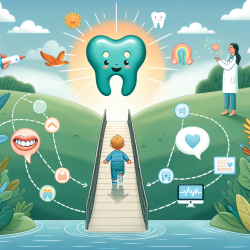Introduction
Autism Spectrum Disorder (ASD) is a complex neurodevelopmental condition characterized by challenges in social interaction, communication, and repetitive behaviors. With the rising prevalence of ASD, practitioners are continually seeking effective management strategies. The research article, "A Spectrum of Solutions: Unveiling Non-Pharmacological Approaches to Manage Autism Spectrum Disorder," provides a comprehensive review of non-pharmacological interventions that offer promising avenues for managing ASD symptoms.
Understanding Non-Pharmacological Interventions
While pharmacological treatments have been the mainstay for managing ASD, they often come with side effects and do not address all symptoms. Non-pharmacological interventions, as highlighted in the research, include dietary modifications, nutritional supplements, antioxidants, and complementary and alternative medicine (CAM) therapies. These interventions focus on holistic management, aiming to improve the quality of life for individuals with ASD.
Dietary Interventions
The research emphasizes the role of dietary interventions in managing ASD symptoms. Diets such as the gluten-free casein-free (GFCF) diet and ketogenic diet have shown potential in reducing behavioral issues and improving cognitive functions. However, practitioners must carefully monitor these diets to prevent nutritional deficiencies.
Nutritional Supplements
Nutritional supplements, including omega-3 fatty acids, zinc, and vitamins, play a crucial role in supporting brain health and reducing ASD symptoms. The research suggests that these supplements can enhance neuroplasticity and improve behavioral outcomes. Practitioners are encouraged to consider these supplements as part of a comprehensive management plan.
Antioxidants and Phytonutrients
Antioxidants such as curcumin and resveratrol have demonstrated neuroprotective effects, potentially improving behavioral symptoms in ASD. These compounds help reduce oxidative stress and inflammation, which are often elevated in individuals with ASD. Incorporating antioxidants into the treatment plan may offer additional benefits.
Complementary and Alternative Medicine (CAM)
The research highlights the potential of CAM therapies, including herbal remedies and camel milk, in managing ASD symptoms. These interventions are generally well-tolerated and can be integrated with conventional treatments to enhance outcomes. Practitioners should remain open to exploring these alternative options.
Encouraging Further Research
While the research provides valuable insights, it also underscores the need for further studies to validate the efficacy of non-pharmacological interventions. Practitioners are encouraged to contribute to this growing body of research by documenting clinical outcomes and sharing findings with the broader community.
Conclusion
Non-pharmacological interventions offer a promising avenue for managing ASD, complementing traditional pharmacological approaches. By integrating dietary modifications, nutritional supplements, antioxidants, and CAM therapies, practitioners can provide holistic care that addresses the diverse needs of individuals with ASD. To read the original research paper, please follow this link: A Spectrum of Solutions: Unveiling Non-Pharmacological Approaches to Manage Autism Spectrum Disorder.










